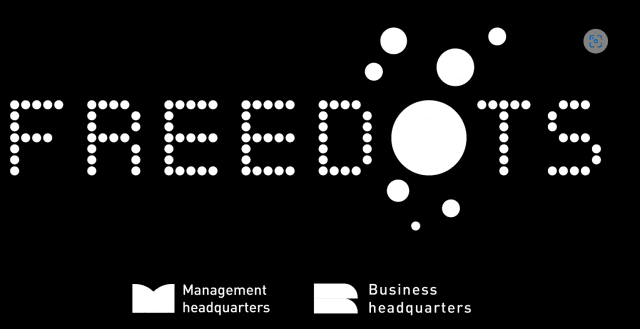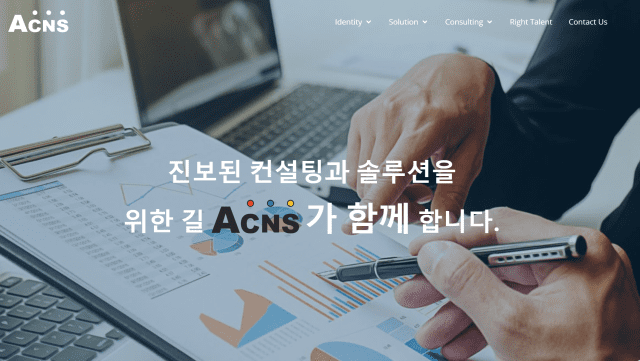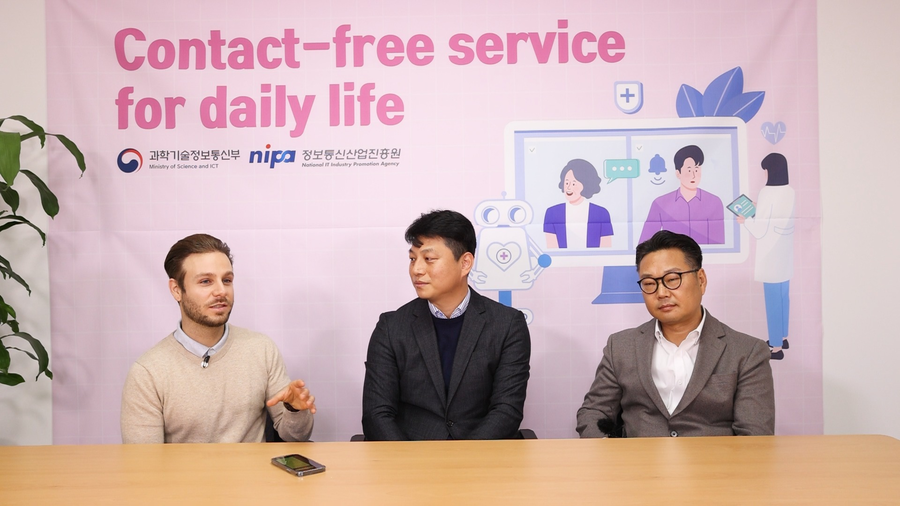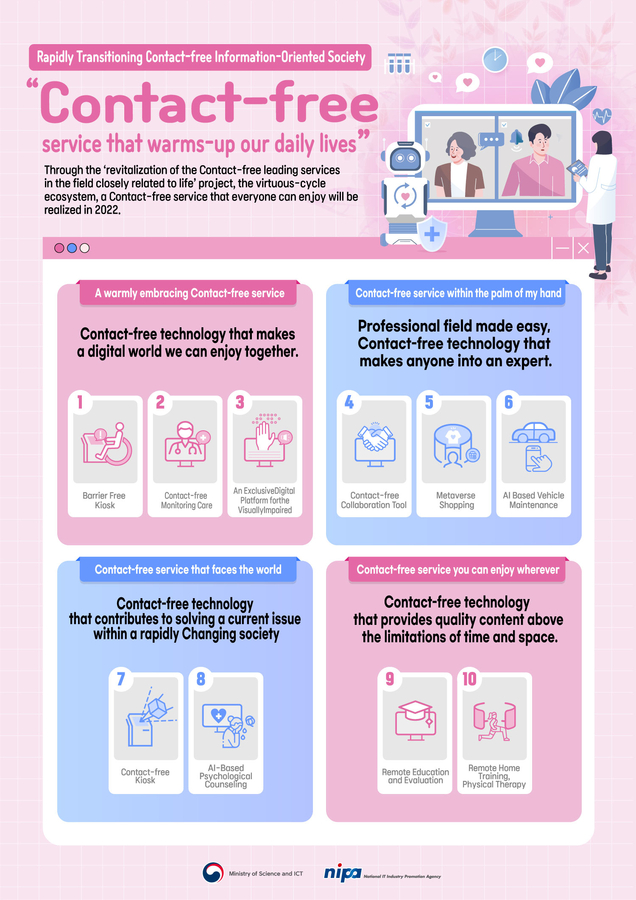All Press Releases for December 24, 2022
[Korea Contact-Free ] FREEDOTS "Realizes Digital Equality by Providing Integrated Kiosks"
Jointly Developing and Demonstrating a Product for Visually Handicapped People and the Socially Disadvantaged with ACNS
LOS ANGELES, CA, December 24, 2022 /24-7PressRelease/ -- FREEDOTS, a company participating in the 'Close-to-life Contact-Free Leading Service Project' implemented by the Ministry of Science and ICT and the National IT Industry Promotion Agency (Chairman Seongwook Huh, hereafter referred to as NIPA), is a creative company that conducts business combining art and tech and was established in 2020. They develop media technology in collaboration with artists that utilize design, new media, and technology, and create new value in spaces.
They are jointly participating in NIPA's 'Close-to-Life Contact-Free Leading Service' with the electronic document company, ACNS (Advanced Consulting & Solution, CEO Jinseo Yang). This is the 2nd year of the Close-to-Life Contact-Free Leading Service Project, with NIPA starting it last year. As a project to develop, demonstrate, and proliferate contact-free leading services that are close to the daily lives of the people, it receives great responses from participating companies.
FREEDOTS is the hosting organization of this project, and ACNS is combining their strength with them as a participant. The two companies have been selected and are working for a selected task (digitally vulnerable group) of the 'Close-to-Life Contact-Free Leading Service Project'. In particular, they are developing and demonstrating smart signage, interactive media, immersive content, and CDS (Content, Device, Service) integrated hybrid kiosks to realize 'digital equality'. FREEDOTS will be in charge of manufacturing the kiosks, and ACNS will be working on automatic braille translation and viewer advancement.
Youngtae Moon, the CEO of FREEDOTS, said that, "We seek to develop barrier-free kiosks and content that allows senior citizens, children, visually disabled, and others who have low access to information to see, hear, and touch the latest information and content, and provide universal services that satisfy their right to access information," and said, "In particular, we want to provide people with visual disabilities, who aren't able to use kiosks, with access to information and the benefits of a technological society to allow them to enjoy the same quality of life as others."
The products being developed by the two companies have a few characteristics. First, they used universal design the create an easy-to-use kiosk. It allows them to overcome handicaps like different types of disabilities, physical limitations, and gaps in digital information to easily use these kiosks. Users can change between UI/UX modes with a single button. They also used an enclosure design so that wheelchair users can also easily used the kiosks.
Second, they made kiosks specialized for people with disabilities. Amongst people with disabilities, the use of kiosks is especially difficult, if not impossible, for people with visual impairment. This is because kiosks are based on display monitors, which are visual information equipment. In order to allow these people with visual impairment to use kiosks, the two companies created barrier-free kiosks that use digital braille, audio services, smart keypads, and braille terminals. They are also developing products that advance these kiosks to allow them to be used conveniently over long periods of time.
Third, they provide HTML5-based PDF streaming viewer solutions. The viewer solution follows the removal of the authorities' public website plugin. In order to satisfy the people's right to know, existing posts and publications have been changed to a structure in which various files are registered and individuals can download them to view them. The user's satisfaction of the service must be improved with a viewer solution that allows files of any size to be viewable upon clicking. Even though if the original form is somewhat distorted, there are solutions that enable viewing for simple preview purposes. However, the solution developed by ACNS has the advantage of being able to view files identically to the original file.
It is also possible to view large files immediately with a streaming method. In addition, it can be set so that downloads are disabled and can only be viewed to prevent the unnecessary distribution of the original or set to only use web browsers memory so that the user terminal doesn't unintentionally leak the original file to a temporary folder.
Though all web browsers only allow the screen to be zoomed in by 5x, ACNS' solution allows the screen to be zoomed in by 10x for people with visual impairment and for senior citizens. It can be used on both PC and on mobile platforms (smartphones).
Fourth, they are automatic braille translation solutions for electronic documents. Most braille translation tools for electronic documents are currently PC solutions that individuals have to manually control. Solutions that translate web page (HTML) files to braille on a server-base were recently released, but electronic books are provided as PDF files or EPUB files, and the company explained that solutions that automatically translate on the server-base like ACNS' solution instead of through the manual labor of individuals does not yet exist.
The two companies said that, "The braille books currently produced by the government are limited to around 500 books," and said that, "The solution we provide not only automatically translates web pages (HTML) to braille on the server, but other various formats of files as well, such as PDF, EPUB, HWP, HWPX, DOC, DOCX, ODT, and TXT."
This solution complies with the translation standard of the Ministry of Culture, Sports, and Tourism, the standard of the International English Standard Braille, and the National Library of the Disabled's guidelines for braille translation. Though the quality might be slightly lower than the work of professional braille translators, the two companies stated that, excluding diagrams and images, most braille transliterations can be accurately transcribed.
The clients of this product include senior citizens, people with disabilities, and children, who are considered digitally vulnerable in the fields of basic and public services. Barrier-free kiosks for people with physical disabilities are mainly used in the fields of basic and public services across society, in places like public institutions, social welfare institutions, and educational institutions. Youngtae Moon, the CEO of FREEDOTS, emphasized that, "Kiosks need to be able to go beyond whether someone has disabilities or not, and overcome gaps in digital information and physical limitations to provide benefits to everyone."
The HTML5-based PDF streaming viewer solution is mainly applied in the internal document centralization system or document management system of organizations. It has also been applied for viewing posts and publications on public institution homepages. It was also recently applied to mobile terms and conditions and product description services in the financial sector, as well as for the bills service. Theautomatic braille translation solution for electronic documents have been applied to the work system used by public officials for visually impaired people in accordance with the Act on the Employment Promotion and Vocational Rehabilitation of Person with Disabilities.
According to the Braille Act, As public institutions are obligated to provide braille documents to visually impaired civil petitioners who request braille versions of documents according to the Braille Act, the managers of the public institution homepages purchased and applied the solutions to these homepages.
The two companies said that, "We wanted to guarantee the rights to access information and benefits of technology to the socially vulnerable, who are considered digitally vulnerable as well, through new media technology," and revealed that, "Realizing our solution is playing a part in allowing everyone to equally access services in a digital service environment gave us a sense of duty. SMEs are unable to develop the technology they want to develop without government support due to poor financial resources. We applied for this project because we judged that this demonstration task is absolutely necessary in developing effective products by taking developed products as a base and developing and demonstrating additional elements in line with the requests of actual users."
The competitive HTML5-based PDF streaming viewer solution of the two companies have various strengths. First, even large files are able to be quickly viewed. Second, it has a large capacity for concurrent access. Third, it supports a 10x zoom-in of the screen for people with low vision and senior citizens. The standard braille solution for electronic documents that the two companies possess are competitive in several ways. First, it is the only product that support server-based braille translation of electronic books (PDF, EPUB). Second, it complies with and supports both standard braille for Korean and English. Third, it supports viewing of both braille and other various electronic documents via screen reader without the need for downloading.
The barrier-free kiosks provided by the two companies used universal design to provide convenience in use for people who have been restricted in using kiosks due to difficulties in mobility or physical limitations. In order to overcome limitations in displays that require them to be seen by the eyes to enable use by the visually impaired, they applied things like screen zooming, audio support, smart keypads, and braille terminals.
The HTML5-based PDF streaming viewer solution was supplied to various public institutions like the Korean Intellectual Property Office, Ministry of Justice, and Ministry of Environment. In the private sector, it has been applied to Woori Bank's WON banking service and SK Telecom's mobile billing service. The electronic document standard braille solution has been selected as standard technology for the Ministry of Interior and Safety's On-nara Document 2.0 System and is being proliferated to all departments and local governments. In the area of homepages, it has been adopted by institutions such as Dongjak-gu Office, the Ministry of Health and Welfare, and the National Pension Service.
With their participation in Close-to-Life Contact-Free Leading Services serving as a catalyst, the two companies have hopes to discover foreign companies at the level of middle-income countries that wish to provide services for the visually impaired, and supply products to them. They expect underdeveloped and developing countries to find it difficult to prioritize human rights and equality but expect conscious countries among middle-income countries to take an interest in the products and solutions of the two companies. The two companies said that, "Rather than companies leading the adoption of our products, we believe that governments, social welfare and educational institutions are our first targets," and revealed that, "We want to make public and welfare institutions from the whole world as our business partners."
The two companies have accomplished big things with their participation in the 'Close-to-Life Contact-Free Leading Service Project'. They have obtained technology to translate the two main formats in the electronic book market of PDF and EPUB into braille. The companies believe that, not only have they taken the first steps towards cultural enjoyment services for people with visual impairment but have also contributed to society with media technology through the creation of barrier-free kiosks for digitally vulnerable people.
Jinseo Yang, the CEO of ACNS, said that, "ACNS is the only company in Korea that can provide legal and institutional consulting in the field of electronic documents as well as platform-based barrier-free technology," and Youngtae Moon, the CEO of FREEDOTS, said that, "FREEDOTS, a new media and immersive content company, is striving to go beyond spaces to gift humanity with new value and lead a more advanced life."
When asked about visions for the future, the two companies said that, "In order for braille translation standards established by the nation to fully take root in the actual field, it is still necessary to improve areas that are lacking," and emphasized that, "The technology we developed cannot solve everything, due to the limitations of electronic document format technology. However, we still wish to grow as companies that truly realize a barrier-free world by developing effective products that enable people with visual impairment to enjoy equal services without discrimination in a digital service environment."
# # #
Contact Information
AVING NEWS
Seoul
Korea
Voice: 01040680324
E-Mail: Email Us Here
Website: Visit Our Website
Follow Us:





